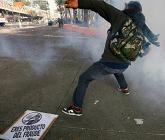Mexico Rising: “Peña Nieto is not my President!”

The mass protests against Mexico’s new President are part of a global movement against the power of business and the farce of representative democracy.
We’ve seen the same images before.
We saw them in Athens on June 28 and 29, 2011 when the Government was voting on the imposition of further austerity measures that would strangle the middle and lower classes. Outside, tens of thousands of people had encircled the Parliament at Syntagma Square, fighting against the riot police, the last-remaining “protector” of the government. Despite the opposition of the people, whose interests it was supposed to be defending, the government voted for the measures.
After that, we saw the same images in Spain on September 25, 2012. Mariano Rajoy’s government was passing austerity measures in its own turn, while thousands of Spanish indignados had gathered around Madrid’s Neptuno Square, surrounding Parliament. Of course in this case too the riot police intervened with violence, even firing rubber bullets against the protesters, leaving tens of them injured. Again, despite the opposition of the people, whose will the Spanish government was supposed to be implementing, the austerity measures were voted through.
And now we are watching the same images again, this time in Mexico, where the Partido Revolucionario Institucional (PRI) returned to power today with its “new face”, Enrique Peña Nieto, as the new President of Mexico.
Outside the Palacio Nacional, since dawn, numerous young people, identified by the press as members of Mexico’s #YoSoy132 student movement, protested against an election that they consider “imposed” by the media and obtained through corruption. Of course, they also had to face the police, who responded with extreme violence leading to dozens of injuries and one death: shot in the head with a rubber bullet.
The PRI, which the protestors refer to as PRInosauro, is the hegemonic party that had practically been governing Mexico ever since the Mexican Revolution. The PRI, through a strategy of clientelism and repression had managed to renew its power every six years for over seven decades, by continuously adapting to new circumstances. That is, until the 2000 elections, when it lost for the first time to PAN. Today, the PRI is returning to power after 12 years in opposition, represented by its “new face” — or its new mask, as the protesters argue — Enrique Peña Nieto, who, in an effort to distance himself from his party’s authoritarian past, has famously said that he wasn’t even born when the PRI murdered dozens (some say hundreds) of activists in the 1968 student movement in Tlatelolco.
Interestingly enough, the new President of Mexico and his party now have to face another challenge: #YoSoy132 — the most vibrant student movement this country has seen since the Tlatelolco massacre. The YoSoy132 movement is mainly comprised of university students and professors, who have mobilized against the manipulation of information by the mass media (they accuse Peña Nieto of being a “construction” of Televisa and Azteca, the country’s biggest TV channels).
The student movement has since developed into a broader social movement for real democracy, transparency, free and fair elections, and opposition to the government’s neoliberal policies and human rights violations (such as those of Peña Nieto in Atenco, where a police crackdown left two people dead, hundreds injured, and 26 women sexually assaulted). Furthermore, like the movements in Greece and Spain, YoSoy132 is a leaderless, horizontal movement for real democracy, and firmly belongs to the same cycle of protest as the Occupy movement and the students movements of Quebec and Chile.
Today, these protesters “welcomed” Mexico’s new President in their own way. And were “welcomed” by him with his.
What we are witnessing in Spain, Greece, Mexico, and other parts of the globe, is the birth of a transnational movement-family that is mobilizing against the farce of representative democracy and the growing influence of business and banking interests on national governments, as well as the role of the mass media in manipulating public opinion. Back in 1997, another Mexican, Subcomandante Marcos of the Zapatista Army of National Liberation, writing from the mountains of Mexico’s South-East, framed the grievances as follows:
The State, in neoliberalism, tends to shrink to the “indispensable minimum”. The so-called “Benefactor State” does not only become obsolete, it separates itself of all it was made up of as such, and it remains naked. In the cabaret of globalization, the State shows itself as a table dancer that strips of everything until it is left with only the minimum indispensable garments: the repressive force.
It’s the same “striptease” we have been witnessing in the past two years, in places as distinct and as distant as Greece, Spain, and Mexico among others.
And what is for sure, is that this particular striptease is not very popular.
At all.



